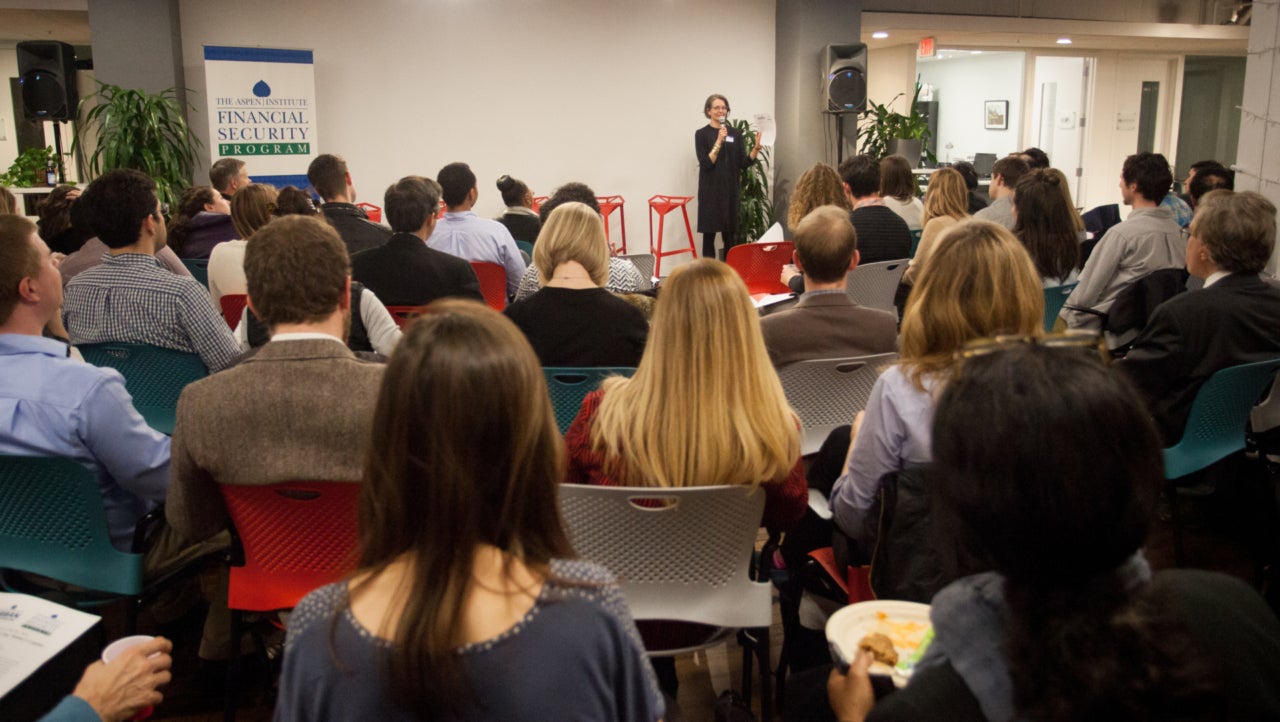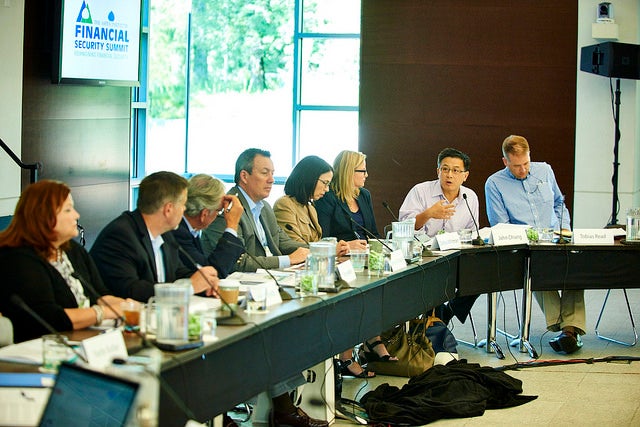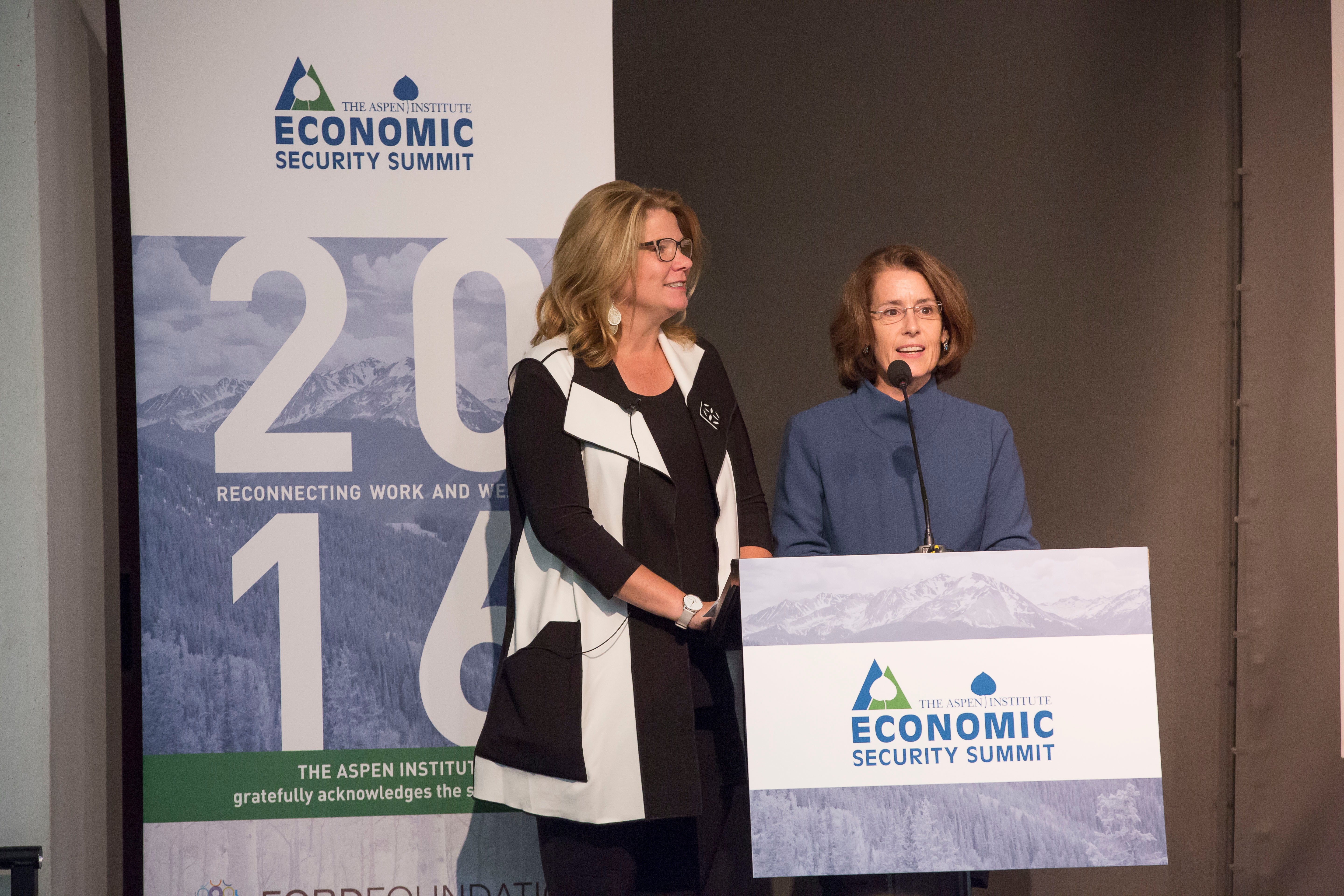Big Idea Night #2: Financial Insecurity
The Aspen Institute’s Urban Innovation Lab and Financial Security Program tackled one of Washington’s most persistent problems: widespread financial insecurity. The event featured four thinkers and doers pursuing new ways of empowering financially insecure workers and consumers in the nation’s capital and beyond. The speakers represented voices not normally together in dialogue – two “fintech” entrepreneurs, a nonprofit practitioner, and a labor activist. Over the course of an hour, they “pitched” some of their best solutions for alleviating poverty and financial insecurity in the city.
Here’s what they had to say:
Pitch #1: Lending Circles
Economic parity is the avenue to social justice.
Marla Bilonick | Executive Director of the Latino Economic Development Center (LEDC), one of two local family service providers that have recently started offering lending circles to DC-area residents. Developed by Mission Asset Fund, lending circles are a peer-to-peer program that provides a zero-interest loan to help participants build credit and access affordable, small dollar loans.
THE PROBLEM
- At least 64 million people nation-wide do not have credit scores
- 51 percent of DC credit users rely on subprime credit
- 25 percent of DC households are underbanked
- 12 percent of DC households are unbanked
- 17 percent of DC households live in income poverty
THE PITCH
Lending circles provide participants with an opportunity to build credit in an environment that reflects community and cultural practices. 90 percent of those who join a lending circle have previously participated in an informal lending circle in their community. Many of the consumers who come into LEDC’s office do not have social security numbers and are credit invisible. In joining a circle, participants can go from having a FICO score of 0 to 600+ after just one cycle.
You have to have a credit score and your finances in order to access many financial products says @MarlaBilonick #DCBigIdeas pic.twitter.com/Ab9FNVvIHw
— Aspen FSP (@Aspen_FSP) January 27, 2017
Visit LEDC to learn more.
We need to help more students in their last mile, help them get over that last hurdle, so they can enter the financial market as a better credit risk once they graduate.
Stacie Whisonant | Founder and CEO and Pay Your Tuition (PYT) Funds, Inc., a DC-based startup that bundles crowd-funding and micro-loans in a mobile app to help students pay for college.
THE PROBLEM
The cost of higher education has become increasingly unaffordable. While working with students at Howard University, PYT found that many students were unable to graduate because they had outstanding balances due to the university.
THE PITCH
PYT created a platform that allowed students to crowdfund with the hope that students could come and raise money for their tuition. However, they quickly discovered that the students they were attracting weren’t able to raise enough funds from family and friends—many of whom also struggled financially. PYT then asked, what can we do with the money students are able to raise? They decided to match what students could raise with a small dollar loan. Unfortunately, many students faced yet another hurdle; they did not have credit scores or had low scores. The solution to this problem? Alternative credit scoring. Using thousands of alternative data points, from Facebook, to LinkedIn, academic records, and more, PYT decided to pull together alternative credit scores for students—scores that reflect general responsibility and indicate that the students are in fact, a good risk. In the end the platform works like this: Need $5,000 to graduate? Raise $1,000, PYT will collect alternative data, you’ll receive an alternative credit score, get access to a small loan, pay off your debt, and graduate.
PYT recruited students through financial aid directors and grassroots orgs. says @StaciehelpsPYT @payyourtuition #DCBigIdeas pic.twitter.com/kW0b0FcEHC
— Aspen FSP (@Aspen_FSP) January 27, 2017
Visit PYT to learn more.
We live in a world designed to make us want to spend money.
Justin Howell | Co-Founder and CEO at Rize, a DC-based startup that uses behavioral science and technology to completely automate savings, so customers can effortlessly set money aside out of each paycheck.
THE PROBLEM
80 million millennials in our country are saving nothing. As a society we spend, on average, more than two percent of what we earn.
Overspending is the single biggest reason people are motivated to use @rizesaving says @HowellJustin #DCBigIdeas pic.twitter.com/xrtzJPB3ZN
— Aspen FSP (@Aspen_FSP) January 27, 2017
THE PITCH
Rize can help customers save five to 10 percent of their take-home income each month. How? By moving money from checking accounts to Rize accounts immediately after each paycheck and empowering users to save before they spend. Once your money is transferred from your checking account to your Rize account, it’s harder to transfer back than simply moving between accounts at the same bank. It can take 3 to 5 days business days to transfer savings from your Rize account back to your checking account. According to Justin and his team, consumers need that extra separation between themselves and their money in order to spend less, and Rize provides that. Rize has found that users value the embedded discipline. The app is free to use, but users are encouraged to pay what they can to help support the service. 93 percent of their customers have contributed to the app. While they are currently operating in private beta only, they already have thousands of millennials on their waitlist.
Visit Rize to learn more.
Pitch #4: Predictable Scheduling
Workers deserve dignity and stability in work, and it’s the government’s responsibility in a democracy to make sure they have this.
Elizabeth Falcon | Executive Director at DC Jobs with Justice (DC JWJ), a nonprofit dedicated to fighting for workers’ rights and an inclusive economy. Since 2014, DC JWJ has been fighting for DC legislation that would guarantee local workers have advance notice of their schedule.
THE PROBLEM
DC JWJ spoke with 400 workers and found that four out of five workers said that it is very or somewhat important that they receive more hours at their current job; more than half said that they learn about their schedules less than a week in advance. Unpredictable schedules present workers with numerous barriers, including the inability to seek secondary employment that would allow them to supplement their already low wage. As Elizabeth explained, “If a job doesn’t tell you when or how much you’ll work at a given time, you can’t get another job.”
THE PITCH
DC JWJ believes that a job should be somewhere where you work a regular number of hours, at a predictable time, for a predictable amount of money—and they are trying to make this a reality for all workers through advocacy. They also believe the government has a role in defining what work looks like, and they are currently advocating for legislation that would require employers to give their workers advance notice of their schedules. They argue that unions are also a critical part of what makes a job “good,” and find that workers receive the best support in the workplace if they are unionized.
“The government has a role in defining what work looks like” says Falcon of @DCJWJ #DCBigIdeas
— Aspen FSP (@Aspen_FSP) January 27, 2017
Visit DC JWJ to learn more.
Watch the full event below:




